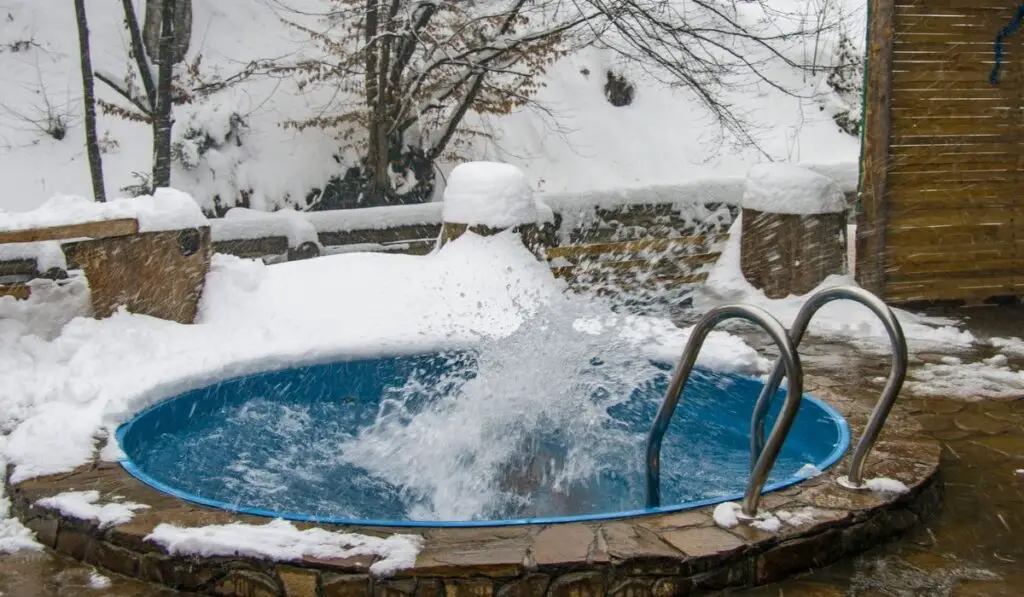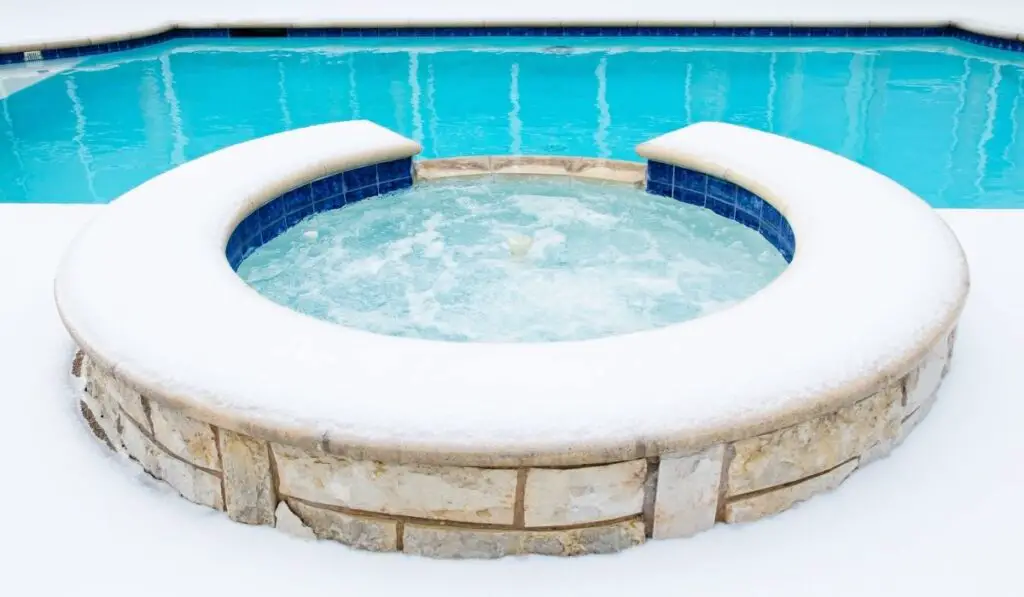If you’re a new pool owner and the colder months are approaching for the first time (or have already arrived), you might be wondering if you need to be concerned about the pool freezing. It’s important to know what temperature can cause a pool to freeze as well as how to stop this from happening.
Like most water sources, pool water freezes at 32 degrees Fahrenheit, though saltwater pools may be able to make it down to ~28 degrees. There are many ways to keep your pool from freezing, including keeping the pool pump running, using a water heater, and adding special pool antifreeze.
Now that you know it’s possible for a pool to freeze, let’s take a look the various techniques you can use to keep it from happening to yours. Prevention is key here–don’t wait until it’s too late, because a frozen pool can result in damaged hardware or even a leaky liner when you go to put the pool back in service after the temperature comes back up.
At What Temperature Does Water Freeze in a Pool?

As with most water sources, pool water will begin to freeze when the temperature dips to 32 degrees Fahrenheit. It would likely take significantly lower temperatures to freeze the pool solid, but you can still expect a sheet of ice at the top of your pool as temperatures dip below freezing.
Saltwater may be able to survive without freezing until 28 degrees Fahrenheit, but it’s such a negligible difference that it’s safer to take 32 as the benchmark.
What Happens if Pool Water Freezes?
If your pool freezes, what happens and what you should do really depends on how much has frozen.
If there’s a sheet of ice over the top that’s less than half an inch thick, there may not be much damage. Break up the ice and make sure you scoop any debris out of the water. Ensure the pool cover hasn’t been punctured by the sharp ice and then run the pump to try and prevent it from freezing again.
If you don’t break up the ice and the sheet deepens, it can be a much bigger problem. The tiles and grout can crack which can cause costly damage to the pool.
How Do You Keep Your Pool From Freezing?

If you want to keep your pool from freezing, you can follow each of these tips. They should help keep the water in liquid form.
Keep the Pump Running
Keep the pool pump running during the coldest part of the day and it should stop the pool from freezing over completely. Moving water can’t freeze, so this is perhaps the most effective method.
You can also buy a pool pump timer (on Amazon) so you don’t have to remember to turn it on and off, and there are even some that turn on when they detect the temperature dropping below a certain level.
If possible though, or if you don’t have an automatic detector, keep the pool pump running for 24 hours a day, as this is the most surefire way to prevent the water from freezing in place.
Heat Up the Water
Using a heater to heat up the water is another effective method to stop freezing, but it’s also a very costly one. Whether this works for you will depend on your budget. The best method comes at a hefty price!
Angle the Jets Upward
Angling the jets from the bottom of the pool towards the top is a simple method that can go a long way in preventing freeze damage. Because the moving water is hitting the surface, it makes it much harder for the surface to freeze over. Nonetheless, make sure you keep checking on the pool and break up any ice that forms.
Keep the Pool Covered
It’s essential to keep your pool covered in the winter so that you can lock in any heat, as water left out in the open is much more likely to freeze. A solar pool cover (on Amazon) is even better at retaining heat from the sunlight it takes in and your heater, if you use that too.
Maintain the Water Level
When you’ve closed the pool for winter, it’s all too easy for the water level to get out of control. You may not notice the rain and melted ice causing the level to rise, but a higher water level means it’s more likely to freeze.
If the water gets too high, it can mess with the circulation and damage the equipment, which is not good if there’s ice to contend with as well. After any bad weather, keep an eye on the pool and lower the water level as needed.
Use (Non-Toxic) Antifreeze
Putting antifreeze in the pool is a quick method that can help to protect the water against freezing. You can find the non-toxic version (on Amazon) so that it doesn’t make the water unsafe to swim in.
Maintain the Equipment
Maintaining the equipment will go a long way toward preventing freeze damage even if there is ice. If any screws have eroded in the pool light housing or if there’s something wrong with the filters, they may not hold up as well, so make sure you check them before you close the pool for winter or before those freezing temperatures hit.
Keep All Valves Open
For the most part, all valves will usually be open on the pool anyway. However, there might be a time when you’ve closed or half-closed some. Ensuring all are open is vital to prevent freezing, as it will keep the water circulating.
Moving water can’t freeze. This is the most important thing to keep in mind; it will help your pool survive the cold months.
